Tag Archives: ICCAT
ICCAT North Atlantic Swordfish Stakeholder Engagement Session
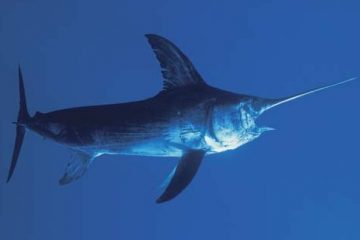 The Advisory Committee to the U.S. Section to ICCAT is holding a public meeting via webinar session to receive an update and provide input on the development of a management strategy evaluation (MSE) for North Atlantic swordfish. The meeting is open to all interested stakeholders. The virtual meeting will be held by webinar session on June 13, 2024, from 10 a.m. to 12 p.m. EDT. Please register to attend, >>CLICK TO READ<< 12:51
The Advisory Committee to the U.S. Section to ICCAT is holding a public meeting via webinar session to receive an update and provide input on the development of a management strategy evaluation (MSE) for North Atlantic swordfish. The meeting is open to all interested stakeholders. The virtual meeting will be held by webinar session on June 13, 2024, from 10 a.m. to 12 p.m. EDT. Please register to attend, >>CLICK TO READ<< 12:51
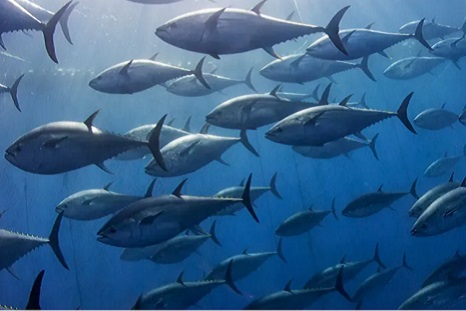
In bluefin tuna, fisheries science is never neat
Pinchin’s eponymous kings are Atlantic bluefin tuna, marine predators that can weigh well over a thousand pounds, “imagine a grand piano shaped like a nuclear weapon,” as Pinchin puts it. Bluefin are extraordinary organisms: warm-blooded, keen-eyed, coated in pigment-producing cells that flash a rainbow of colors when the fish are hauled onto a boat. Pinchin excels at evoking her piscine subjects, whose sickle-shaped tails beat nearly as fast as a hummingbird’s wing. “To stand beside a just-landed giant bluefin, still slick from salt water, feels akin to standing beside a natural marvel like Niagara Falls or an erupting volcano,” writes Pinchin, a Nova Scotia-based science journalist. “There’s beauty, but also danger.” Her book isn’t just an ode to bluefin — it’s about humankind’s obsession with them, a fixation as old as our species. >click to read< 16:29
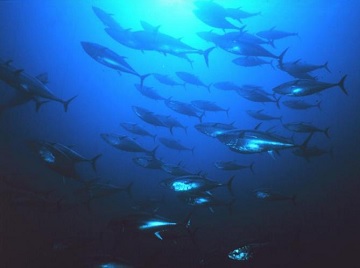
What’s on the line? Atlantic bluefin tuna
The Atlantic bluefin tuna season ranks high enough up on the fishing world calendar that the fish even has two of its own television shows. This species is one of the largest open ocean migratory species of finfish found in the northwest Atlantic. Many fish are caught weighing well over 1,000 pounds and measuring 8 feet or more in length. In North Carolina, the Atlantic bluefin tuna can be found year-round at varying degrees of availability, but are usually the most plentiful from January through March and into April off the Outer Banks, and November through December, with fish numbers increasing in October. >click to read< 11:57
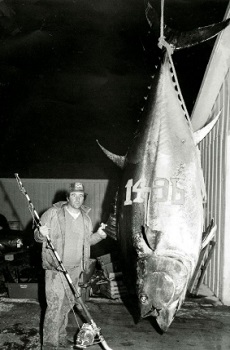
A Tuna’s Worth – Inside a Canadian fishery that pursues them
Bluefin tuna are a luxury that feeds the egos of many, the bellies of few.,, North Lake, a community too small to support an ATM, calls itself the tuna capital of the world. In the 1960s and 1970s, anglers here regularly landed bluefin that broke world records. People came from all over the planet to hunt the storied giants, which swam faster and fought harder and grew bigger than any other sport fish. In 1979, a North Lake fisher named Ken Fraser caught the largest in history, at 679 kilograms. In a black-and-white photo commemorating the event, Fraser stands wide-eyed, blood-spattered, and completely dwarfed by the hanging behemoth—as if he were the prey, not the predator.,, On the other side of the world, in Japan, bluefin was well on its way to becoming the most expensive item on sushi menus. photos, >Audio report, click to read< 09:57
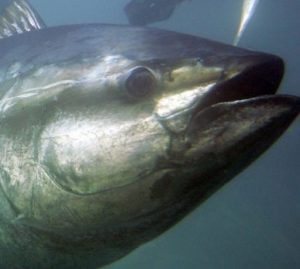
Is It Time To Start Eating Western Atlantic Bluefin Tuna? Yes, it is, Margot! Its Sustainable!
Back in January, the Monterey Bay Aquarium Seafood Watch quietly changed their sustainability rating for western Atlantic bluefin tuna from Avoid to Good Alternative. Their report states that Atlantic bluefin caught using more sustainable fishing practices (e.g., rod and reel, harpoon, or larger fishing nets called purse seines) are a good alternative to higher risk commercially fished options. The authors note that additional research would need to be done to prove definitively that the Atlantic bluefin is no longer overfished, but the evidence points toward a healthy stock. They cite low bycatch in the handline and harpoon fisheries and “moderately effective” management as reasons for the changing the rating. Randy Blankinship, chief of NMFS’ Highly Migratory Species Management Division was quoted saying “when seafood consumers purchase Atlantic bluefin tuna caught in the United States, they’re supporting robust environmental standards that bolster both bluefin populations and our economy.” This should be good news, but it’s hardly been news at all. >click to read< 08:24
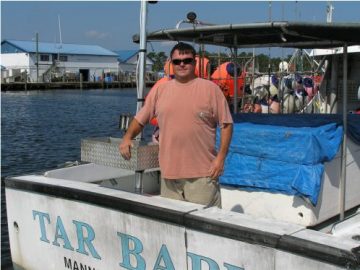
Dewey Hemilright: U.S.Fishermen in desperate need to level playing field in U.S. marketplace
The U.S.A is a member of ICCAT, which is the International body with 53 contracting party countries {CPC}with additional 6 countries having cooperating status that manages Highly Migratory species in the Atlantic Ocean,, ICCAT has a {SCRS}, which stands for {standing committee on research statistics},,, I attended as a member of U.S.A. delegation in November 15-25 ,2019 the 26th annual meeting of ICCAT in Mallorca, Spain. >click to read< 17:35
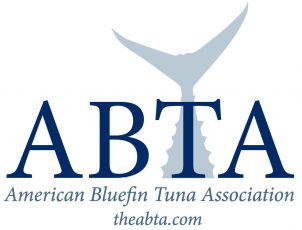
ICCAT Meeting Ends After ‘Spectacular Failure’ to Protect Bigeye Tuna
The International Commission for the Conservation of Atlantic Tunas (ICCAT) concluded its annual plenary meeting on November 19 after a spectacular failure to arrive to a comprehensive agreement on badly needed management measures to address the present poor state of Atlantic bigeye tuna stock. Bigeye tuna is highly coveted by sashimi markets worldwide, similar to bluefin tuna. ICCAT’s eight-day meeting, held this year in Dubrovnik, Croatia, was attended by over 700 people representing 52 countries. The U.S., Canada, South Africa and a handful of other nations strongly advocated for the adoption of measures that would end overfishing immediately and rebuild the stock within 10 years. However, >click to read<20:21
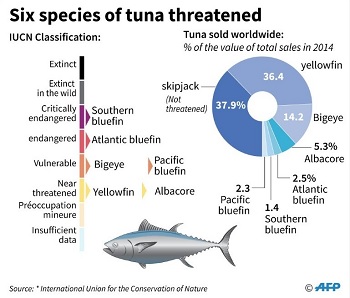
Fisheries nations to decide fate of declining bigeye tuna
Dozens of nations with commercial fisheries in the Atlantic Ocean will grapple next week with a new finding that bigeye tuna, the backbone of a billion dollar business, is severely depleted and overfished.,,, An internal report by 40-odd scientists working under the inter-governmental International Commission for the Conservation of Atlantic Tunas (ICCAT), finalised last week, shows that populations have fallen to less than 20 percent of their historic levels. Even more critical, the stock is barely half the size needed to support a “maximum sustainable yield”—the largest catch that can be taken without compromising long-term stability of the species. Current harvests, overwhelmingly legal, are also more than 60 percent above levels that would give bigeye at least a fighting chance of recovering its numbers, the report said. >click to read<15:46
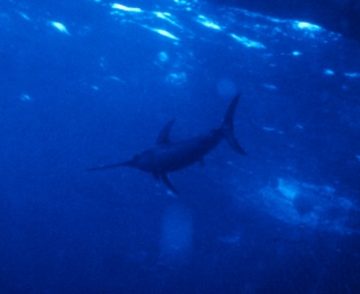
Uninformed vs. Science: The story of swordfish in the Northwest Atlantic is complex and subject to many versions of revisionist histories.
Every once in a while you read something that is so wrong, it sticks with you. A recent statement by the American Sportfish Association, (ASA), published in the Fishing Wire, met and exceeded the mark of just plain wrong. And to compound the affront, several marginalized groups threw in their support for good measure. I know better than to bark at the moon but here goes,,,Uninformed vs. Science. By Edward Gaw >click to read< 14:53
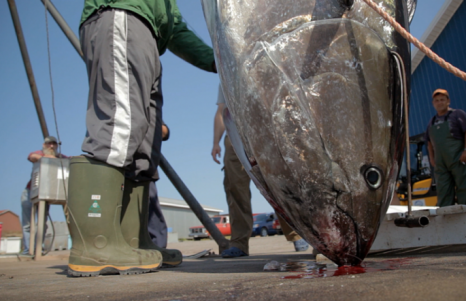
Bluefin tuna in P.E.I. are so hungry they no longer fear humans
Bobbing up and down on cold Atlantic waters, several fishermen toss scaly, silver mackerel overboard. It’s a delicious snack for a bluefin tuna — the largest species of tuna in the world, measuring more than six feet in length and weighing up to 1,600 pounds. The newcomer among them, a writer and ecologist, expects to spend the afternoon patiently waiting for a bite. Instead, the bluefin tuna here in North Lake, P.E.I. are so abundant and so hungry that within minutes their trademark yellow caudal finlets are circling the boat. click here to read the story 18:29

THE 2018 MAKO SEASON IS SAVED!
The United States and other nations recently finished up a week of tuna, swordfish and shark management discussions at the 2017 annual meeting of International Commission for the Conservation of Atlantic Tunas (ICCAT) in Marrakech, Morocco. The good news from overseas is that there’s a bluefin tuna quota increase coming for U.S. fishermen; perhaps even better news is that motions by some ICCAT delegates to shut down the North Atlantic mako shark fishery failed (though an increase in harvest size is forthcoming.),,, The final agreement focuses on measures to reduce fishing mortality and efforts to further strengthen data collection, while protecting opportunities for U.S. recreational and commercial fishermen to retain small amounts of shortfin mako sharks. click here to read the story 15:35

ICCAT Ups Canadian Share of Bluefin tuna quota
Fishermen in Atlantic Canada will be able to catch another 77 tonnes of Bluefin tuna next year after an international commission agreed to raise the annual quota following an improvement in stocks. The increase was approved Tuesday during a meeting in Marrakech, Morocco of the International Commission for the Conservation of Atlantic Tunas (ICCAT). Environmental group ‘disappointed’ Still, the increase was denounced by the Ecology Action Centre, click here to read the story 17:47

Nations decide to increase quota for Atlantic Bluefin tuna
Countries fishing the eastern Atlantic and the Mediterranean agreed Tuesday to expand the annual quota for prized Bluefin tuna to reflect an improvement in their stocks. Two officials at the meeting of the 50-nation International Commission for the Conservation of Atlantic Tunas said that at the end of the meeting Tuesday, countries have agreed to hike the quota from 24,000 tons this year to 28,000 next year, with a further 4,000 added in each of the following two years. The officials spoke on condition of anonymity because the decision has not been officially announced yet. click here to read the story 12:26

Nations press panel to raise annual Bluefin tuna quotas
Nations fishing the Atlantic Ocean and the Mediterranean Sea have started assessing how much more prized Bluefin tuna can be caught in the next few years amid signs that stocks of the iconic fish are recovering. The 50-nation International Commission for the Conservation of Atlantic Tunas opened its year-end meeting Tuesday in Marrakech, Morocco, facing pressure from nations to allow more Bluefin to be caught after years of cuts. click here to read the story 12:19
Atlantic bluefin tuna stocks are rebounding — but raising quota proves controversial
 Fishermen up and down the New England coast say it has been decades since they’ve been able to catch so many Atlantic bluefin tuna, so fast. Once severely depleted, populations of the prized sushi fish appear to be rebuilding. Now the industry and some scientists say the international commission that regulates the fish can allow a much bigger catch. But some environmental groups disagree.,, click here to read the story 09:18
Fishermen up and down the New England coast say it has been decades since they’ve been able to catch so many Atlantic bluefin tuna, so fast. Once severely depleted, populations of the prized sushi fish appear to be rebuilding. Now the industry and some scientists say the international commission that regulates the fish can allow a much bigger catch. But some environmental groups disagree.,, click here to read the story 09:18
Countries Pledge To Recover Dwindling Pacific Bluefin Tuna Population
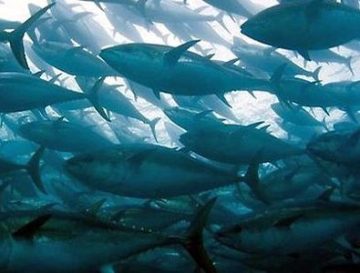 In a joint meeting Friday in Busan, South Korea, the two groups that manage Pacific bluefin tuna reached a historic long-term agreement that would put the species on the path to recovery. The Western and Central Pacific Fisheries Commission and the Inter-American Tropical Tuna Commission agreed to take steps to rebuild the population to 20 percent of historic levels by 2034 — a sevenfold increase from current levels. Stocks of Pacific bluefin have fallen to 2.6 percent of their historic size, with countries like Mexico, Japan, Korea and the U.S. exceeding fishing quotas within the last two years. click here to read the story 17:02
In a joint meeting Friday in Busan, South Korea, the two groups that manage Pacific bluefin tuna reached a historic long-term agreement that would put the species on the path to recovery. The Western and Central Pacific Fisheries Commission and the Inter-American Tropical Tuna Commission agreed to take steps to rebuild the population to 20 percent of historic levels by 2034 — a sevenfold increase from current levels. Stocks of Pacific bluefin have fallen to 2.6 percent of their historic size, with countries like Mexico, Japan, Korea and the U.S. exceeding fishing quotas within the last two years. click here to read the story 17:02
NOAA puts bigeye tuna on overfishing list
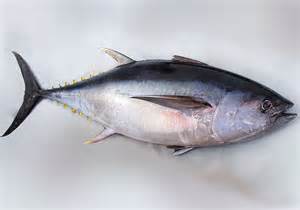 NOAA has put Atlantic bigeye tuna on the overfishing list in its annual Status of the Stocks update. It means the harvest rate is higher right now than the rate that produces its maximum sustainable yield — the largest long-term average catch that can be taken from a stock under prevailing environmental and fishery conditions. It could also mean potential reductions in the total allowable catch will be implemented. Jennie Lyons, from NOAA Fisheries Public Affairs, said the listing is based on the International Commission for the Conservation of Atlantic Tunas’ (ICCAT) most recent accepted stock assessment that showed fishing mortality rate in 2014 exceeded the overfishing threshold by 28 percent. Read the rest here 19:53
NOAA has put Atlantic bigeye tuna on the overfishing list in its annual Status of the Stocks update. It means the harvest rate is higher right now than the rate that produces its maximum sustainable yield — the largest long-term average catch that can be taken from a stock under prevailing environmental and fishery conditions. It could also mean potential reductions in the total allowable catch will be implemented. Jennie Lyons, from NOAA Fisheries Public Affairs, said the listing is based on the International Commission for the Conservation of Atlantic Tunas’ (ICCAT) most recent accepted stock assessment that showed fishing mortality rate in 2014 exceeded the overfishing threshold by 28 percent. Read the rest here 19:53
Raymond Bogan appointed ICCAT commissioner
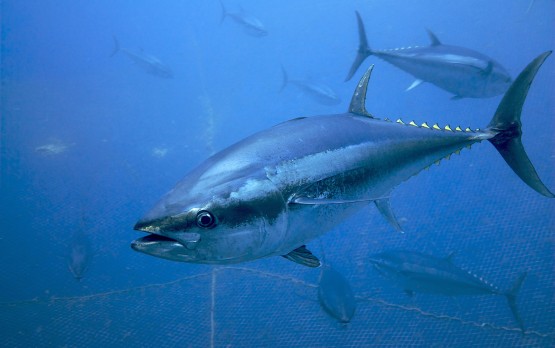 Raymond D. Bogan, a longtime advocate for the rights of recreational fishermen, has been appointed a commissioner to the International Commission for the Conservation of Atlantic Tunas. Under the Atlantic Tunas Convention Act, the United States is represented by three Commissioners; a government representative, another representing the commercial fishing industry and a third representing the recreational community. His appointment was designated by the Secretary of State and announced by NOAA. Read the rest here 13:20
Raymond D. Bogan, a longtime advocate for the rights of recreational fishermen, has been appointed a commissioner to the International Commission for the Conservation of Atlantic Tunas. Under the Atlantic Tunas Convention Act, the United States is represented by three Commissioners; a government representative, another representing the commercial fishing industry and a third representing the recreational community. His appointment was designated by the Secretary of State and announced by NOAA. Read the rest here 13:20
EU counters Pew criticism of ‘blurry science’ as bluefin tuna fishing kicks off with 20% hike
 As the European Union (EU)’s bluefin tuna fishing season in the Mediterranean kicks off at pace, Pew Charitable Trusts has warned the science behind this year’s 20% hike in the Mediterranean and the Eastern Atlantic quotas is uncertain. It also noted concerns over Turkey going outside of scientific fishing advice, and the EU’s delays in implementing electronic catch tracking. “Yes, science seems to indicate a population recovery, but that science is blurry,” Amanda Nickson, who directs tuna conservation efforts for Pew. “This information provided by [Pew] can be a bit misleading,” Read the rest here 20:42
As the European Union (EU)’s bluefin tuna fishing season in the Mediterranean kicks off at pace, Pew Charitable Trusts has warned the science behind this year’s 20% hike in the Mediterranean and the Eastern Atlantic quotas is uncertain. It also noted concerns over Turkey going outside of scientific fishing advice, and the EU’s delays in implementing electronic catch tracking. “Yes, science seems to indicate a population recovery, but that science is blurry,” Amanda Nickson, who directs tuna conservation efforts for Pew. “This information provided by [Pew] can be a bit misleading,” Read the rest here 20:42
Conservationists appalled after Ottawa raises Atlantic bluefin tuna quota
![]() “The government should be going through the Species at Risk Act process so we are certain” that the bluefin catch can be sustainably increased, David Miller, the president of World Wildlife Fund Canada, said Monday. Read the rest here 00:25 Stop whining!
“The government should be going through the Species at Risk Act process so we are certain” that the bluefin catch can be sustainably increased, David Miller, the president of World Wildlife Fund Canada, said Monday. Read the rest here 00:25 Stop whining!
U.S. Goals for the 2014 Annual Meeting of the International Commission for the Conservation of Atlantic Tunas (ICCAT)
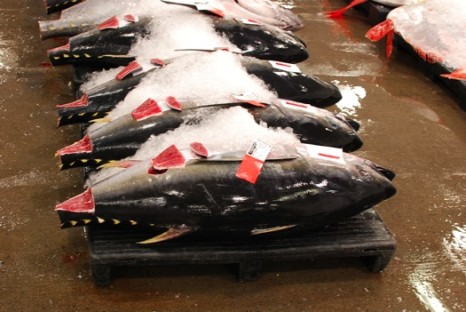 The United States is going to ICCAT (November 10-17, 2014 in Genoa, Italy) with the goal of reaching agreement on science-based management measures for shared stocks and applying a precautionary approach where appropriate, while preserving commercial and recreational fishing opportunities for U.S. fishermen. Read the rest here 15:08
The United States is going to ICCAT (November 10-17, 2014 in Genoa, Italy) with the goal of reaching agreement on science-based management measures for shared stocks and applying a precautionary approach where appropriate, while preserving commercial and recreational fishing opportunities for U.S. fishermen. Read the rest here 15:08
Bluefin tuna stocks rebounding – Tuna stocks not ready for increased quotas, say ecologists
 Atlantic bluefin tuna numbers are up, according to the latest scientific review of the stocks, and Canada believes an increased catch is possible. The study was done in preparation for meetings of the International Commission for the Conservation of Atlantic Tuna next month, which will set fishing quotas for the next two years. Katie Schleit of the Ecology Action Network is hoping ICCAT will,,, Read the rest here 10:14
Atlantic bluefin tuna numbers are up, according to the latest scientific review of the stocks, and Canada believes an increased catch is possible. The study was done in preparation for meetings of the International Commission for the Conservation of Atlantic Tuna next month, which will set fishing quotas for the next two years. Katie Schleit of the Ecology Action Network is hoping ICCAT will,,, Read the rest here 10:14
Fished out – Atlantic fishing nations fail to act to protect tuna and sharks.
 The ICCAT nations did maintain catch limits on Atlantic bluefin tuna. They also announced steps to force large fishing vessels to carry a unique identification number beginning in 2016, after many cases of illegal fishing off West Africa, with ships often changing names and flags in order to evade sanctions over illegal fishing. “Sharks is where they really dropped the ball,” said Elizabeth Wilson, director of the Pew Charitable Trusts’ international ocean policy unit, which had observer status at the gathering. “There was very little discussion about sharks. They barely even talked about it in their meetings, which is very disappointing,” she said in a phone interview after the meeting ended. more@thestar 10:22
The ICCAT nations did maintain catch limits on Atlantic bluefin tuna. They also announced steps to force large fishing vessels to carry a unique identification number beginning in 2016, after many cases of illegal fishing off West Africa, with ships often changing names and flags in order to evade sanctions over illegal fishing. “Sharks is where they really dropped the ball,” said Elizabeth Wilson, director of the Pew Charitable Trusts’ international ocean policy unit, which had observer status at the gathering. “There was very little discussion about sharks. They barely even talked about it in their meetings, which is very disappointing,” she said in a phone interview after the meeting ended. more@thestar 10:22
Bluefin Tuna Catch Quota Maintained as Shark Limit Rejected
![]() The commission, which is known as ICCAT and has 46 member countries as well as the European Union, decided to leave the 2014 quota at 1,750 metric tons in the western Atlantic and 13,400 metric tons in the eastern Atlantic at a week-long meeting in Cape Town. more@bloomberg 13:59
The commission, which is known as ICCAT and has 46 member countries as well as the European Union, decided to leave the 2014 quota at 1,750 metric tons in the western Atlantic and 13,400 metric tons in the eastern Atlantic at a week-long meeting in Cape Town. more@bloomberg 13:59
ICCAT decides to help conserve Atlantic bluefin tuna
 At the conclusion of their week-long meeting in Agadir, 48 member governments of the International Commission for the Conservation of Atlantic Tunas (ICCAT) this week adopted positive measures that will help conserve the iconic Atlantic bluefin tuna, and advance shark protection in the future. But they deferred meaningful action on other pressing matters. more@fis
At the conclusion of their week-long meeting in Agadir, 48 member governments of the International Commission for the Conservation of Atlantic Tunas (ICCAT) this week adopted positive measures that will help conserve the iconic Atlantic bluefin tuna, and advance shark protection in the future. But they deferred meaningful action on other pressing matters. more@fis
Pew gears up for Blue Fin Tuna fight with ICCAT over Catch Quota’s with working group meeting in Montreal, June 26 to 28
This week, fisheries managers and scientists from around the world will meet in Canada and shape the fate of the western Atlantic bluefin tuna, signaling whether fishery managers will choose to follow sound science and let this tuna population recover or ignore precaution and return to crippling levels of overfishing. The latter could result in the collapse of the western Atlantic bluefin population. continued@pew
Scientists fear Canada will fish bluefin tuna and other species to extinction
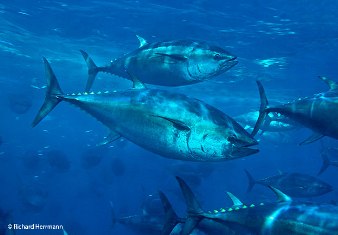 Top marine scientists are denouncing Canada’s management of fish stocks as a commercially driven approach threatening to wipe out species at risk. Read more
Top marine scientists are denouncing Canada’s management of fish stocks as a commercially driven approach threatening to wipe out species at risk. Read more
Despite stock gains, NOAA chief sought cuts for tuna catch
“She is on an agenda to deny American fishermen the right to succeed.”
“Dr. Lubchenco pushed hard to reduce the projected quota to far less than the current 1,750 metric tons to further conserve bluefin although such a reduction would have a devastating effect on fishermen and their communities,” Zales said in an email to the Times. “Managing and maintaining maximum sustainable yield is the prime objective of ICCAT and NOAA.” http://www.gloucestertimes.com/local/x520552032/Status-quo-holds-for-tuna-catch


































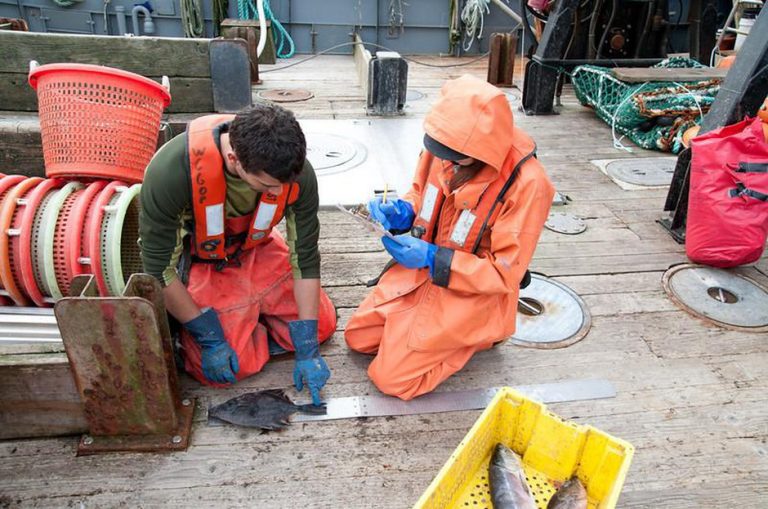

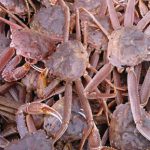
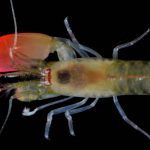

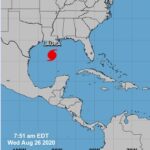

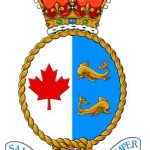





Fishermen fear Hudson Canyon sanctuary will mean more restrictions
The canyon is a prolific fishing ground that starts about 90 miles offshore from Manasquan Inlet and is in the crosshairs of a public debate over the sanctuary designation, which would give NOAA more leverage managing the resources of the largest submarine canyon off the Atlantic Coast. Commercial vessels fish for tunas, squid and lobster, while the state’s recreational fishing fleet of for-hire vessels continually run anglers out to the canyon to catch fresh tuna and tilefish. “We’re probably the greatest and strictest fishery management country in the world. Why do we need this extra layer on top of everything we have now?” said Jason Bahr, a seafood wholesaler and vice president of Blue Water Fisherman’s Association, a trade group of commercial longline fishermen who fish for pelagic species such as tuna and swordfish in the Hudson Canyon. >click to read< 07:50
Share this post